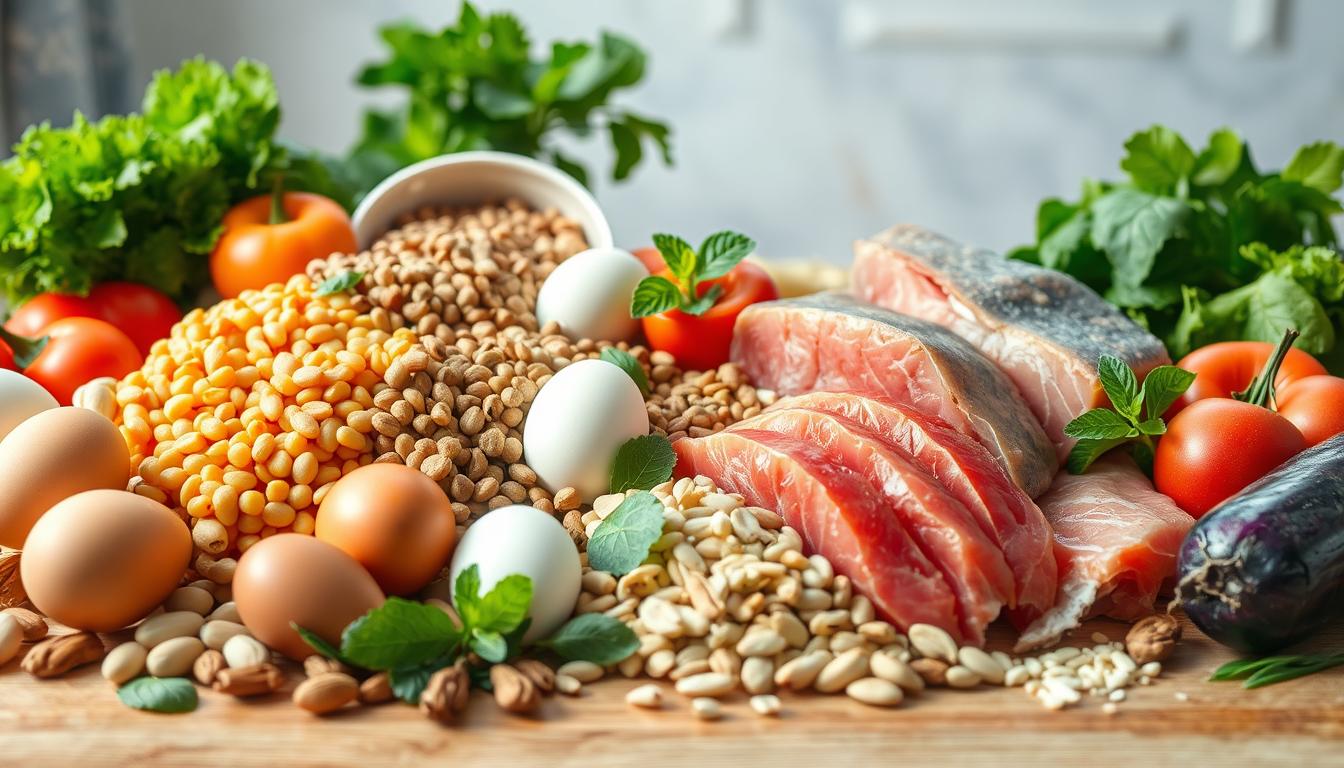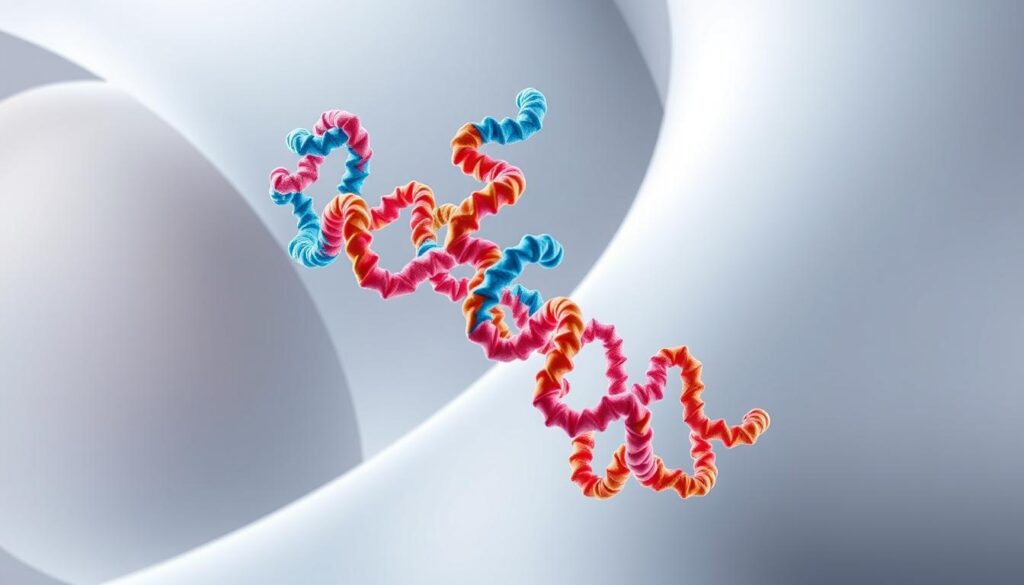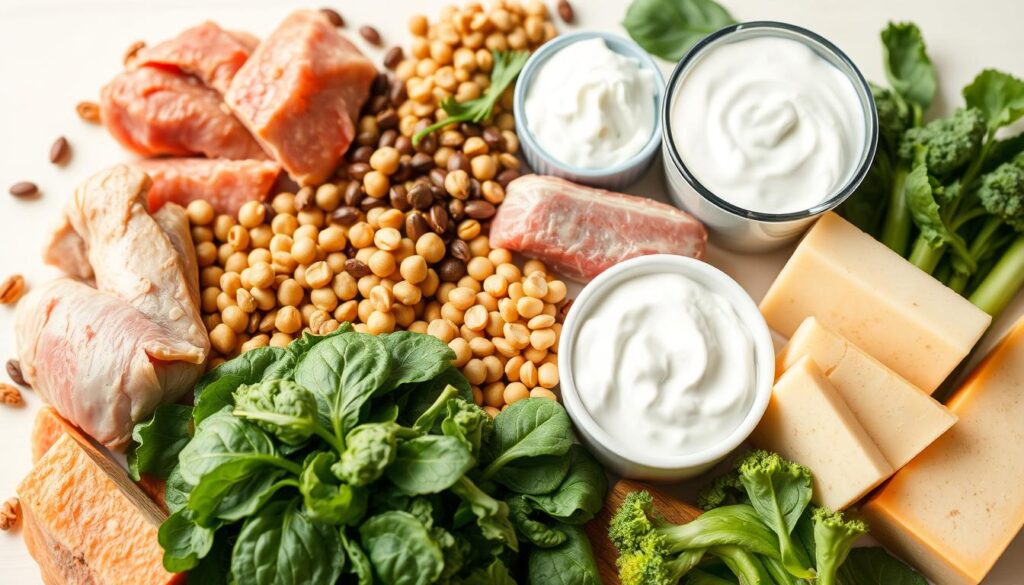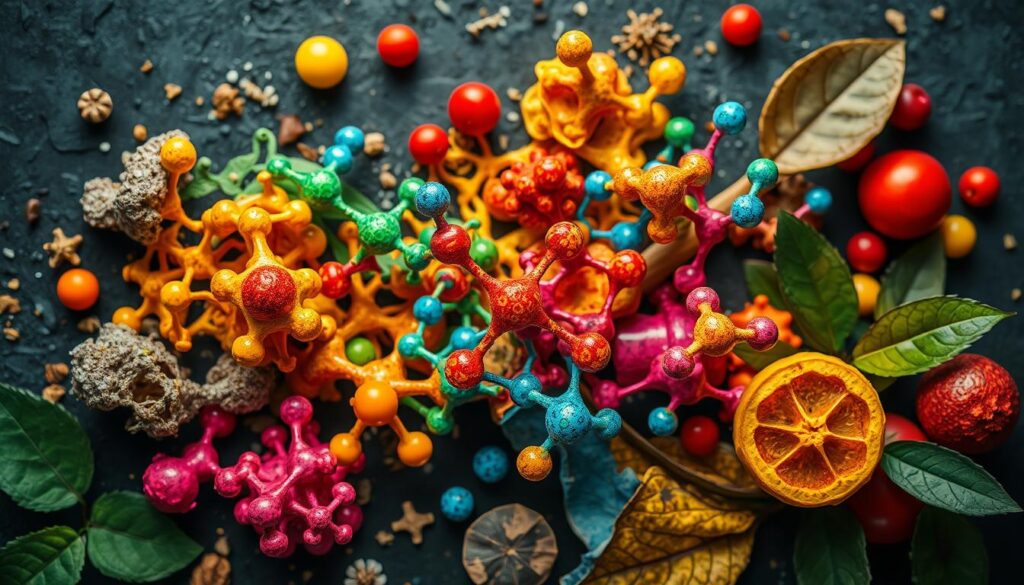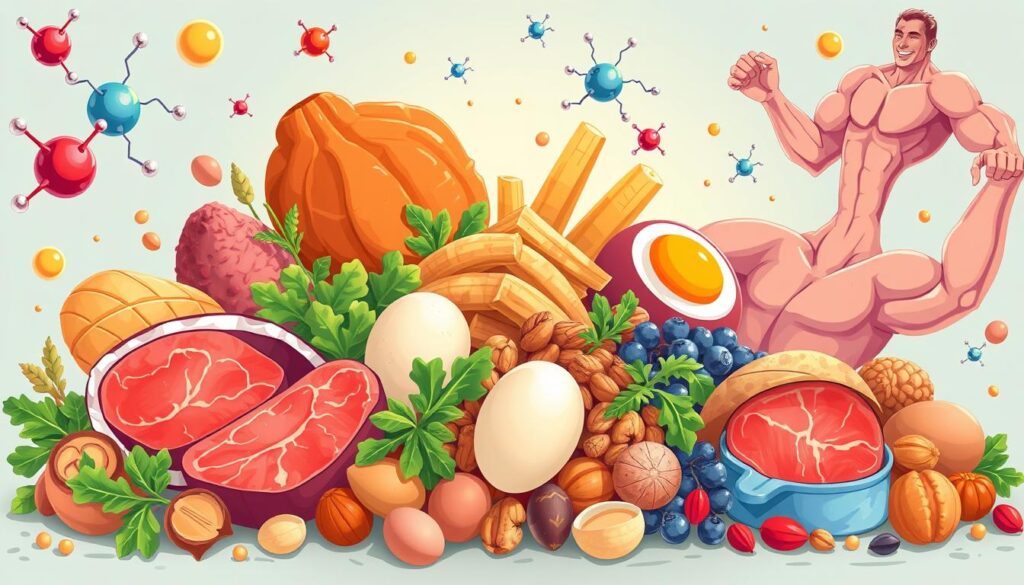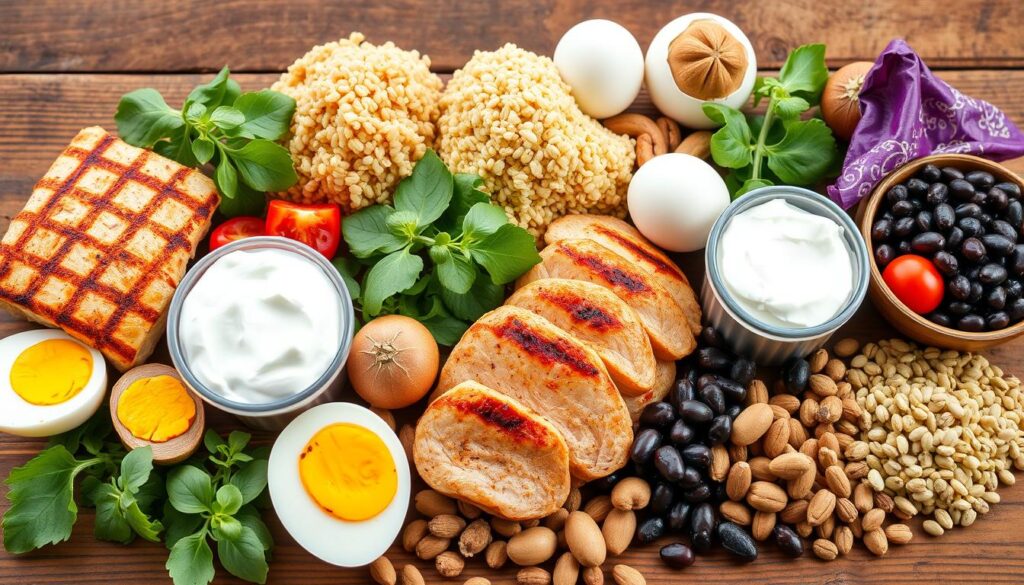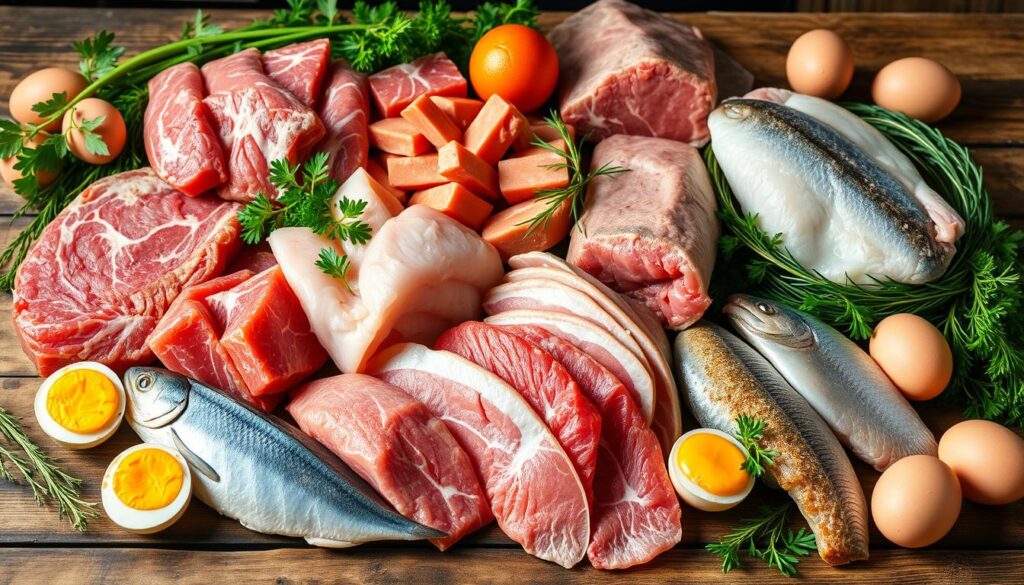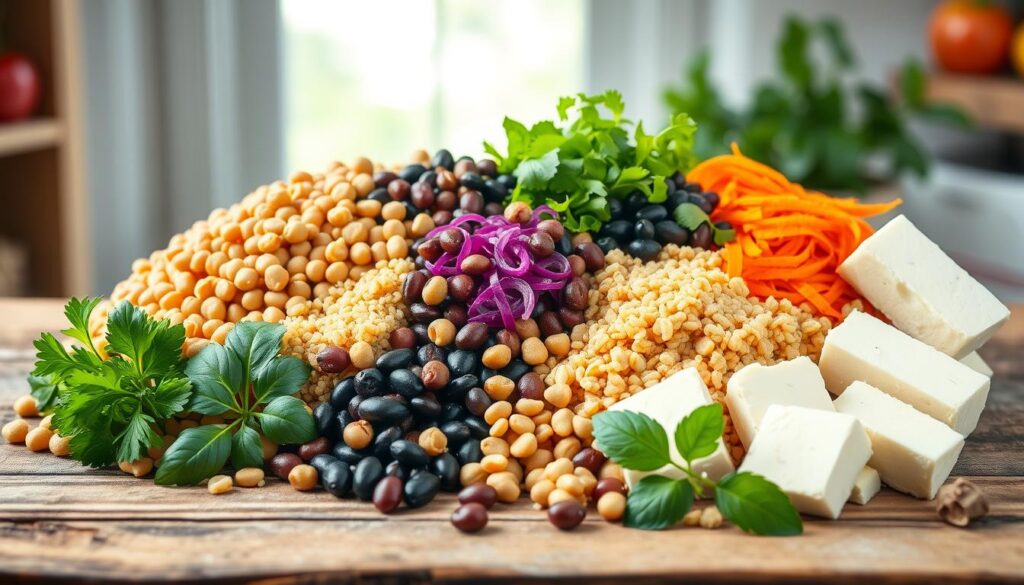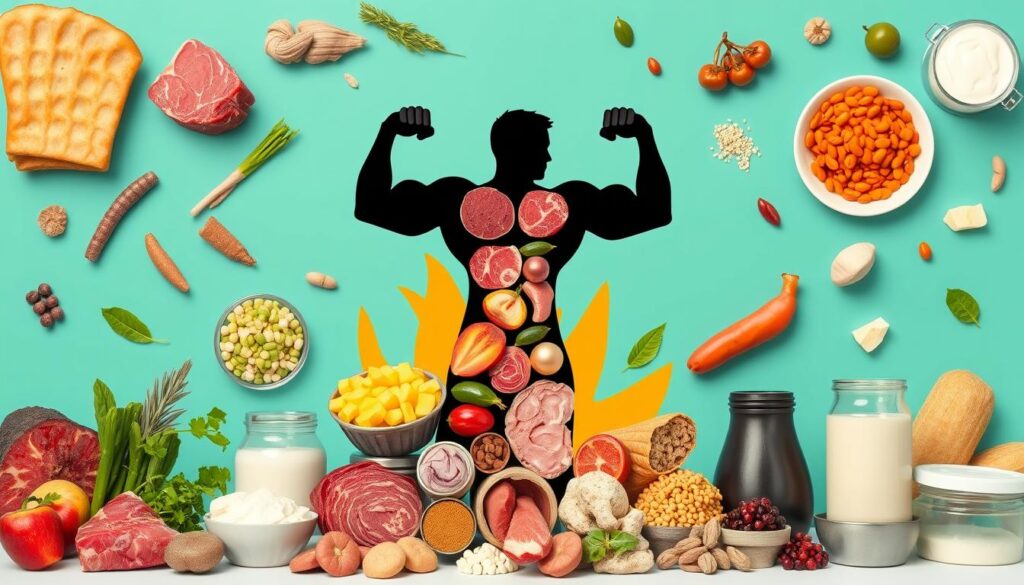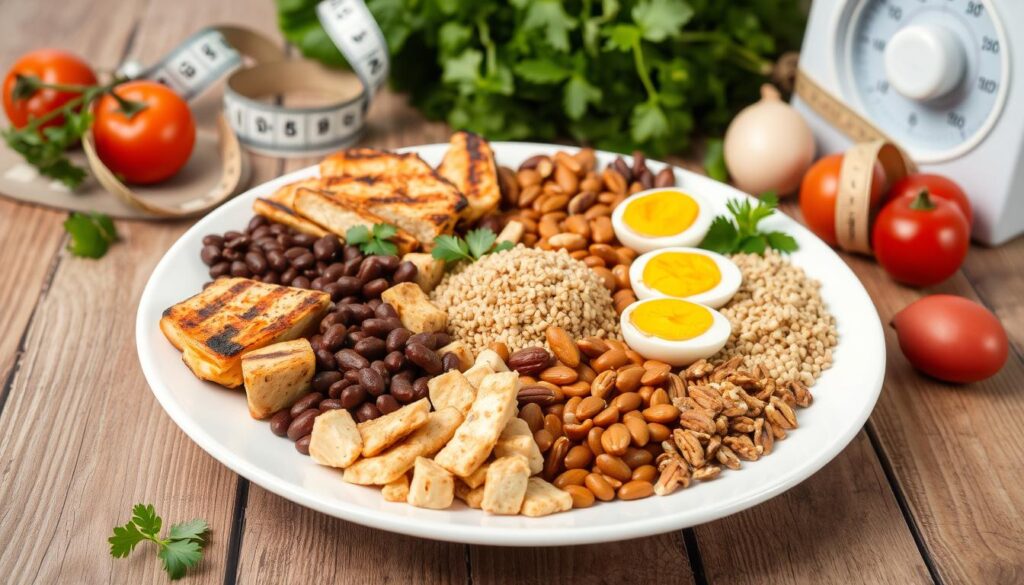Protein is key for our bodies. It helps fix and grow cells. It’s made of amino acids, which are like building blocks for us.
Key Takeaways
- Protein is an essential nutrient that supports cellular function, repair, and growth.
- Adequate daily protein intake is crucial for overall health and well-being.
- Protein can be obtained from a variety of animal-based and plant-based sources.
- Understanding your individual protein needs can help optimize your diet and support your fitness goals.
- Incorporating high-quality protein sources into your meals and snacks can contribute to a balanced, nutrient-rich diet.
Understanding Protein: The Building Block of Life
Protein is a key macronutrient that builds all cells in our bodies. It’s made of amino acids and is crucial for many functions. These include repairing tissues, boosting the immune system, and regulating hormones.
The Dietary Guidelines for Americans 2020-2025 suggest adults should get 10% to 30% of their calories from protein. Good sources include lean meats, fish, eggs, nuts, seeds, beans, soy products, dairy, and whole grains.
Eating enough protein has many benefits. It helps create antibodies, improves blood flow, and balances blood sugar. It also aids in managing diabetes, boosting energy, and supporting muscle growth and recovery. Yet, finding enough protein-rich foods can be hard for some.
| Protein Consumption Guidelines | Daily Protein Needs |
|---|---|
| 10-30% of daily caloric intake should come from protein | Average woman: 45g of protein per day Average man: 55g of protein per day |
Too much protein can cause problems like nausea, constipation, and stomach pain. It can also lead to bloating, weight gain, and dehydration. Finding the right balance is key to staying healthy.
“Protein plays a crucial role in organ, bone, muscle, and hair health, providing a strong foundation for the body.”
Proteins are vital for many bodily processes, from making enzymes and hormones to forming collagen. Getting enough protein is essential for staying healthy and performing well.
The importance of protein in your diet
Protein is key for good health and well-being. It helps build and repair tissues, regulates hormones, and aids digestion. Getting enough daily protein intake is vital.
Daily Protein Requirements
Healthy adults need 10% to 35% of their calories as protein. This means about 0.36 grams of protein per pound of body weight. For women, this is around 46 grams, and for men, it’s about 56 grams. But, needs can change with age, activity level, and health.
Protein’s Role in Overall Health
Eating the right amount of protein boosts health. It can increase metabolism, help with weight management, and lower blood pressure. Protein is also crucial for cellular repair, hormone regulation, and enzyme production.
Timing of Protein Consumption
When you eat protein matters too. Eating protein throughout the day helps with muscle recovery and growth. It also aids in maintaining a healthy weight. Experts say to eat protein within 30 minutes after working out to help muscles heal and grow.
Eating protein-rich foods like lean meats, poultry, fish, dairy, eggs, legumes, and whole grains is beneficial. Knowing your protein requirements and when to eat it ensures your body gets what it needs to function well.
Essential Amino Acids: The Foundation of Protein
Amino acids are the basic parts of protein and are key to our health. Our bodies can make some, but nine are essential and must come from food.
These nine include histidine, isoleucine, leucine, lysine, methionine, phenylalanine, threonine, tryptophan, and valine. Since we can’t make them, we need to eat foods that have them. It’s more important to get them all over the day than at every meal.
- Essential amino acids are the protein building blocks that the body cannot produce on its own and must be obtained through dietary sources.
- Nonessential amino acids can be synthesized by the body, while conditional amino acids are needed during times of illness and stress.
- Animal-based proteins, such as meat, poultry, fish, eggs, and dairy, are considered “complete” proteins as they contain all the essential amino acids.
- Plant-based proteins, like beans, lentils, nuts, and whole grains, are “incomplete” proteins, meaning they lack one or more of the essential amino acids.
Eating a variety of protein-rich foods helps meet your amino acid needs. This supports protein building in your body.
“Amino acids are the building blocks of protein, and essential amino acids must be obtained through diet, as the body cannot produce them on its own.”
How Protein Powers Your Body’s Functions
Protein is key for many body functions. It helps with cell repair, hormone balance, and more. This keeps your body healthy and strong.
Cellular Repair and Maintenance
Protein is the main material for cells, tissues, and organs. It helps fix and replace damaged cells. This keeps your body fresh and strong.
Hormone Regulation
Protein is also important for hormone balance, especially when you’re growing. It helps make and control hormones for growth, metabolism, and cell changes.
Enzyme Production
Most enzymes, which break down food and create new cells, are made of protein functions. These proteins help your body use nutrients for energy and repair.
Overall, protein functions are key for your body’s health. They help with cellular repair and hormone regulation. This makes protein essential for a healthy diet.
“Protein is the foundation for building, maintaining, and repairing the structures in your body. Without it, your cells, tissues, and organs would not be able to function properly.”
| Protein Function | Importance | Examples |
|---|---|---|
| Cellular repair and maintenance | Ensures the continuous renewal and rejuvenation of cells, tissues, and organs. | Skin, muscles, bones, cartilage |
| Hormone regulation | Supports the production and regulation of essential hormones for growth, development, and metabolism. | Puberty, thyroid function, insulin |
| Enzyme production | Enables the efficient breakdown of nutrients and the creation of new cells and body chemicals. | Digestive enzymes, metabolic enzymes |
Complete vs Incomplete Protein Sources
Proteins come in two main types: complete and incomplete. Knowing the difference is key to getting the amino acids your body needs.
Complete proteins have all nine essential amino acids in the right amounts. They are found in animal products like fish, poultry, eggs, dairy, and soy. Incomplete proteins, on the other hand, are missing one or more amino acids. They are mostly in plant foods such as nuts, seeds, whole grains, and legumes.
| Complete Protein Sources | Incomplete Protein Sources |
|---|---|
|
|
Even though complete proteins are the best, incomplete proteins can still help. People who don’t eat meat can mix different plant-based protein sources. This way, they get all the amino acids their bodies need.
To get enough protein, it’s best to eat a variety of complete and incomplete protein sources. This balanced diet supports your health and well-being.
Animal-Based Protein Sources
Animal-based protein sources are often seen as the best. They include lean meats, poultry, fish, seafood, dairy, and eggs. Let’s look at why adding these animal protein sources to your diet is good.
Lean Meats and Poultry
Lean meats like turkey, chicken (without skin), bison, and some pork and beef are great. They have all the amino acids your body needs. Plus, they have less saturated fat.
Fish and Seafood
Fish and seafood are full of protein and omega-3 fatty acids. Fatty fish like salmon, tuna, and mackerel are especially good. They add a lot of nutrition to your meals.
Dairy Products and Eggs
Dairy protein from milk, yogurt, and cheese, plus eggs, are full of nutrients. They give you vitamins and minerals, along with lean proteins.
“Adding different animal protein sources to your diet helps meet your amino acid needs.”
Choosing lean, unprocessed animal protein lets you enjoy their health benefits. It supports your overall health and well-being.
Plant-Based Protein Options
Looking to add more plant-based proteins to your diet? You have many choices. Legumes like pinto beans, black beans, and lentils are great sources. Nuts and seeds, such as almonds and sunflower seeds, also offer a lot of protein.
Soy products, including tofu and tempeh, are also good options. Whole grains like quinoa and brown rice have more protein than refined grains. They’re great for a plant-based diet.
To get all the amino acids your body needs, mix different plant-based proteins. Try pairing beans with rice or adding nuts and seeds to salads. This way, you can meet your protein needs while eating vegetarian or vegan.
“Consuming more fiber from plant-based protein sources can promote good gut bacteria and improve gut health.”
In 2020, 28% of Americans ate more plant-based proteins than in 2019. This shows more people are seeing the health benefits of plant-based diets. Studies link these diets to lower risks of heart disease, obesity, stroke, and type 2 diabetes.
To figure out your daily protein needs, multiply your weight in pounds by 0.36. This rule works for both plant and animal proteins. Choosing plant-based proteins can make your diet more nutritious and help the planet.
Protein’s Role in Muscle Development
Protein is key for building and keeping muscle mass. It gives the amino acids needed for making new muscle fibers. Eating enough protein and doing resistance training helps grow lean muscle and boost strength.
Muscle Recovery and Repair
Eating protein, especially after working out, helps muscles heal faster. It reduces muscle loss risk. Amino acids in protein fix damaged muscle tissues, making them stronger. This is vital for athletes and those who work out hard.
Protein Synthesis
Protein synthesis is making new muscle proteins, vital for muscle growth. When you eat protein, your body breaks it down into amino acids. These amino acids help build and strengthen muscle fibers. Better protein synthesis means more muscle growth and maintenance.
To best support muscle growth, eat a balanced diet with high-quality protein sources. Include lean meats, poultry, fish, dairy, eggs, and plant-based foods like legumes, nuts, and soy. Timing your protein intake around workouts and spreading it out helps muscle recovery and repair.
“Protein is the building block of muscle, and without it, your body can’t effectively build and repair muscle tissue.”
Knowing how important protein is for muscle growth helps you make better choices for your fitness and health goals.
Calculating Your Daily Protein Needs
The amount of protein you need each day depends on several factors. These include your age, sex, weight, and activity level. The recommended dietary allowance (RDA) for protein is 0.8 grams per kilogram of body weight for adults. But, athletes, pregnant women, and older adults might need more.
To figure out your daily protein intake needs, follow these guidelines:
- Sedentary adults: 0.8 g/kg of body weight
- Low-intensity exercise: 0.8-1.0 g/kg of body weight
- Strength-trained athletes: 1.6-2.0 g/kg of body weight
For example, a 170-pound (77 kg) sedentary man needs about 62 grams of protein daily. On the other hand, a 150-pound (68 kg) strength-trained woman might need 109-136 grams of protein daily.
| Activity Level | Protein Intake (g/kg) |
|---|---|
| Sedentary | 0.8 |
| Low-intensity exercise | 0.8-1.0 |
| Strength-trained athletes | 1.6-2.0 |
Older adults might benefit from eating 1.1-1.2 g/kg of protein daily to prevent muscle loss. Also, those recovering from injury or in an energy deficit might need up to 2.0 g/kg of protein daily.
“Consuming up to 2 grams of protein per kilogram of body weight as part of a balanced diet is considered safe in most cases.”
Signs of Protein Deficiency
Protein is key for our health and well-being. Not getting enough can cause physical and mental symptoms. Knowing these signs helps us fix the issue quickly and stay healthy.
Physical Symptoms
One sign of protein deficiency is muscle wasting. Without enough protein, muscles can’t be built or repaired. This leads to losing muscle mass.
Other signs include a weak immune system, slow healing of wounds, and brittle hair and nails. These are all signs of not getting enough protein.
Mental Effects
Protein deficiency can also affect our minds. People might feel tired all the time, have trouble focusing, and feel moody. This can make everyday life harder and lower our quality of life.
Long-term Consequences
If protein deficiency isn’t treated, it can cause serious problems. Kids might not grow properly, and adults could face weaker bones and more infections. It’s important to address this issue early to avoid these problems.
Recognizing protein deficiency signs and acting on them is key to staying healthy. Talking to a doctor can help figure out why and how to get enough protein.
Protein for Weight Management
Adding a high-protein diet to your routine can change the game for weight management. Protein helps control hunger and keeps you feeling full longer. This reduces the need to eat too much.
Research shows eating 30% of your daily calories as protein can cut down calorie intake by up to 441 calories a day. This leads to losing an average of 11 pounds in 12 weeks, without any other diet restrictions.
Protein’s thermic effect is higher than carbs or fats. This means your body burns more calories digesting protein. This helps in managing your weight.
To get the most out of protein for weight loss, aim for 25-30 grams at each meal. Lean meats, dairy, nuts, seeds, beans, and legumes are great protein sources. They’re easy to add to your diet.
If you’re looking for a quick protein boost, try PROTALITY nutrition shake. It has 30 grams of protein per serving. It’s perfect for supporting your weight loss goals.
“Consuming 30% of your daily calories from protein can lead to significant weight loss without any other intentional restrictions.”
A balanced diet with plenty of protein, regular exercise, and lifestyle changes can help you reach and keep a healthy weight. Talk to a healthcare expert to find the right protein amount for you and your weight goals.
Protein Supplements: Benefits and Considerations
Protein supplements are getting more popular as people try to get enough protein. They come in many types, like whey, casein, soy, and plant-based ones. They’re good for those who can’t get enough protein from food, like athletes. But, it’s best to eat whole foods first.
Types of Protein Supplements
The most common types of protein supplements include:
- Whey protein: Made from milk, whey protein is a fast-absorbing protein with all essential amino acids.
- Casein protein: Also from milk, casein protein is slow-digesting. It helps with muscle recovery and growth over time.
- Soy protein: A plant-based option, soy protein is a complete protein. It’s great for vegetarians and vegans.
- Plant-based proteins: Options like pea, hemp, and rice protein are becoming more common. They offer non-dairy protein sources.
When to Use Protein Supplements
Protein supplements are useful in these situations:
- They help with muscle recovery and growth, especially for athletes and those who exercise a lot.
- They’re good for meeting high protein needs, like during pregnancy or for the elderly.
- They’re a convenient way to add protein to your diet if you find it hard to eat enough protein-rich foods.
Always talk to a healthcare professional before starting any supplements. They can help make sure they’re right for you.
While protein supplements are helpful, don’t forget to eat a balanced diet with whole foods. Too much or the wrong kind of supplements can harm your kidneys or liver. Always choose a healthy diet and get advice from a healthcare provider before using supplements.
Protein Digestion and Absorption
Proper protein digestion and nutrient absorption are key for your body to use diet nutrients well. This process starts in the stomach and goes through the digestive system. It delivers amino acids, the building blocks of protein, to where they’re needed.
When you eat protein-rich foods, stomach and small intestine enzymes break down proteins into amino acids. This is vital because the body can only absorb amino acids, not proteins.
- There are 20 amino acids, and the body can make 11. The other nine essential amino acids must come from food.
- Meat, fish, eggs, and dairy are high-quality proteins because they have all nine essential amino acids.
- Vegetarian foods like nuts, beans, and seeds might lack some amino acids. But mixing them, like rice and beans, can make a complete protein.
- The body can mix proteins from different sources to get all essential amino acids, even if not all are eaten at once.
After amino acids are absorbed, they go into the bloodstream and to the liver. The liver then sends them to places like tissues for repair, enzyme making, and energy.
| Habits that Enhance Protein Absorption | Protein Content of Common Foods |
|---|---|
|
|
Knowing how protein digestion and nutrient absorption work helps you make better food choices. This ensures your body gets the most from the protein in your diet.
Special Protein Requirements
While most people need about 0.8 to 1 gram of protein for every kilogram of body weight, some groups need more. This includes athletes, active people, pregnant women, and the elderly.
Athletes and Active Individuals
Athletes and those who are very active need more protein. This is because they need to recover and grow muscle. Endurance athletes should get 1.2 to 1.4 grams of protein per kilogram of body weight. Strength training athletes might need 1.2 to 1.7 grams per kilogram.
Getting enough protein helps them keep and build lean muscle. This is key for their performance and health.
Pregnant Women
Pregnant women need more protein to support their baby’s growth and their own health. They should aim for about 71 grams of protein daily. This is more than the usual 46 grams for adults.
It’s important for the health of both the mother and the baby to get enough protein during pregnancy.
Elderly Population
As people get older, they often lose muscle and strength. This is called sarcopenia. To fight this, older adults might need 1 to 1.2 grams of protein per kilogram of body weight each day.
More protein can help keep muscle mass and strength. This is important for the elderly to stay independent and have a good quality of life.
It’s a good idea for these groups to talk to a healthcare professional about their protein needs. This way, they can make sure they get the right amount of protein for their health.
Common Myths About Protein Intake
In the world of nutrition, many myths about protein intake exist. These myths can lead to wrong beliefs about what we eat. It’s important to know the truth to make good food choices and stay healthy.
One myth is that eating too much protein harms the kidneys in healthy people. But studies show that the right amount of protein doesn’t hurt the kidneys in those who are healthy.
Another myth is that plant-based diets lack enough protein. But, a well-planned diet without meat can get all the protein you need. You can find protein in legumes, nuts, seeds, and whole grains.
It’s also a myth that the body can only use so much protein at a time. The truth is, the body can use protein all day long. Eating 25-30 grams of protein per meal helps repair and grow muscles.
By knowing and debunking these myths, we can create a balanced diet. This diet will meet our protein needs and help us stay healthy and well.
| Myth | Fact |
|---|---|
| High-protein diets are harmful to the kidneys in healthy individuals. | The recommended protein intake, even on the higher end, does not negatively impact kidney function in those without pre-existing kidney issues. |
| Plant-based diets cannot provide adequate protein. | A well-planned vegetarian or vegan diet can easily meet protein needs through a variety of plant-based sources. |
| Protein can only be absorbed in limited amounts per meal. | The body can digest and utilize protein throughout the day, with research suggesting that consuming 25-30 grams of protein per meal can maximize muscle repair and growth. |
By understanding and addressing these common protein myths, individuals can focus on building a balanced, varied diet that meets their unique protein requirements, ultimately supporting their overall health and well-being.
Conclusion
Protein is vital for our health and helps our bodies work right. Eating a balanced diet with enough protein from animals and plants is important. It helps us stay healthy and feel our best.
Knowing how much protein you need and eating protein-rich foods every day is key. This ensures your body gets the amino acids it needs. It’s good for everyone, from athletes to older adults, to stay healthy and perform well.
Having a good nutrition guide that highlights protein in a balanced diet is essential. It helps you live a healthy and active life. By focusing on protein and its benefits, you’re on your way to reaching your health and fitness goals.


